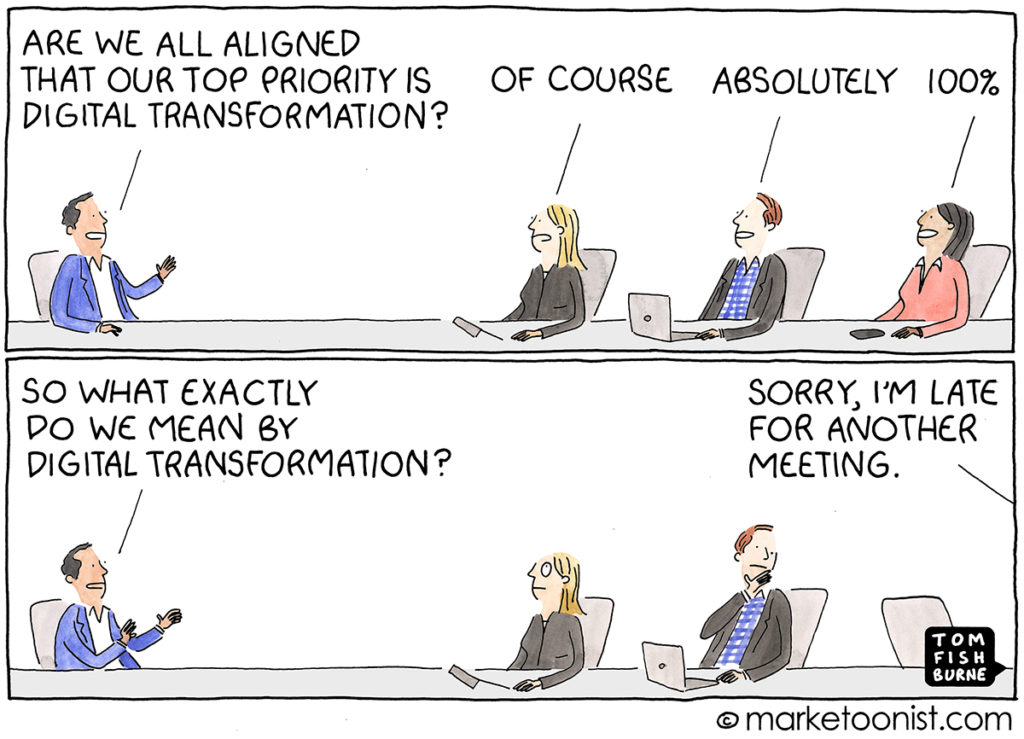
Buzzwords. We have a lot of them. Artificial, autonomous, augmented. Big data, blockchain, bilateral. Crypto, currency, consensus. Distributed, decentralised, democratised.
I’m tempted to write the ABC of technology buzzwords, but know there cannot be any that start with X or Z*.
However, I’m writing this one today because the word digital is becoming overly used and misunderstood. This was sparked by my friend Ajit Tripathi’s excellent write-up about digital transformation. In it, he argues that most companies are not doing digital transformation. They’re just adding digital to their structures rather than converting their core to be technology-first.
I really liked the article. He states that none of the internet giants are doing digital, but that’s because they were born on the internet. They were digital at the start.
He picks on Disney as a case study and how Bob Iger changed the business by starting with the core. He ends with the comment:
“The path to being a digital company is being a technology first company”
I find a lot of people in conversation see digital as something separate to technology. I personally see them as the same. Being digital first is not the same as being mobile first. But being digital first is the same as being technology first, in my view.
And digital is therefore confusing as some use it like me, whilst others see it as separated.
Equally, that means that those who talk transformation are not talking about evolution, but revolution. When we talk about digital transformation, some of us (me) mean that the company is reinvented so that instead of adding technologies to their analogue, industrial core; the company is building a new business, based upon adding access to their technology-led, digital core.
Semantics and pedantics here maybe, but I guess I can see how it’s confusing when most people see digital transformation as some project, function or process.
Source: Marketoonist
As I keep stressing, digital transformation has nothing to do with projects, functions or processes. It is about rethinking the business and rebuilding it from the core. That’s what transformation means, and that’s what Disney did. It’s also what others are trying to do.
This is why I agreed with most of Ajit’s thought process in his piece. Here are a few examples:
“In reality, incumbents’ face the innovators’ dilemma and approach “digital” incrementally and defensively. As a result, throughout the many cycles of technology, history has rather few examples of successful #DigitalTransformation in any industry.”
I agree. That is because most companies do not transform their core. That’s what transformation is meant to mean.
“Financial institutions [are] exploring digital strategies that are a footnote or margin entry in their overall corporate strategy.”
I agree. That is because they are not transforming. They are treating digital as a project.
“Digital remains a rather woolly and undefined concept”
Possibly, if you interpret it incorrectly. If you think it’s ‘a channel’ or ‘an add-on’ or ‘a project’ or ‘being mobile-first’ etc, then yes, you’ve got it completely wrong. Digital is a clear movement towards being digital, technology-first, at the core. I just think people bandy it around as more perfunctory and hence it gets abused.
“My argument is that it’s impossible to drive any kind of transformation without transforming the core business of an incumbent.”
Totally agree. That is what being digital at the core means.
“Silicon Valley doesn’t do digital”
That’s because Silicon Valley is digital. That’s where digital was born.
“Digital transformation practiced incrementally often does not work.”
I agree. You cannot have incremental transformation. Transformation is a revolutionary approach to rethinking the business, not an evolutionary approach. Anyone talking transformation and doing projects or incremental improvements is talking out of their backside.
Overall, Ajit’s article is in alignment with my view of the world. He just needs to make it more clear that most banks doing digital transformation are not transforming the core of their business, but adding technology to the periphery. In that case, they are not doing digital transformation.
*Postnote:
What about X/Open and Zopa? For a full ABC list of tech words, you can click here
Chris M Skinner
Chris Skinner is best known as an independent commentator on the financial markets through his blog, TheFinanser.com, as author of the bestselling book Digital Bank, and Chair of the European networking forum the Financial Services Club. He has been voted one of the most influential people in banking by The Financial Brand (as well as one of the best blogs), a FinTech Titan (Next Bank), one of the Fintech Leaders you need to follow (City AM, Deluxe and Jax Finance), as well as one of the Top 40 most influential people in financial technology by the Wall Street Journal's Financial News. To learn more click here...


